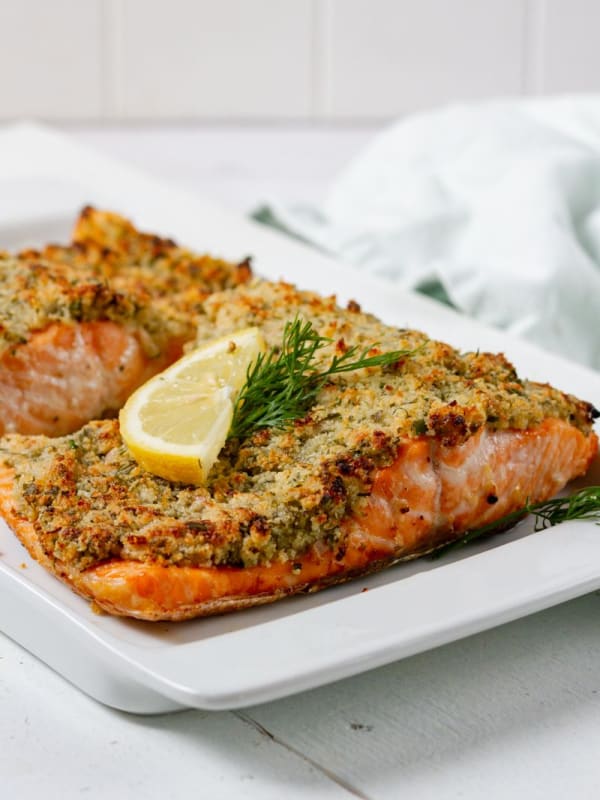Popular Conditions & Diets

Prostate cancer is the second most common cancer among those with testes, yet prevention rarely makes headlines. This article explores how nutrition and lifestyle can significantly influence prostate health—impacting inflammation, hormone balance, and oxidative stress. Research highlights certain “power foods,” including tomatoes rich in lycopene, cruciferous vegetables, omega-3 fatty acids, and flaxseed, as potent protectors against prostate enlargement and cancer. Conversely, diets high in red or processed meats and low in fibre may increase risk. Alongside a balanced diet, exercise, sleep, hydration, and regular screenings are key to maintaining long-term prostate health.
Since 2003, November has been mustache season, and for a very good reason. Prostate cancer is the second most commonly diagnosed cancer worldwide among those with testes, and roughly 375,000 people die of it every year. However, despite the truly alarming statistics, its prevention rarely makes headlines. And this is to say nothing of other incredibly common prostate conditions that fly even further below the radar, like prostatitis and benign prostatic hyperplasia (BPH).
While many of us are familiar with PSA tests and symptoms, like difficulty peeing, few realize just how much everyday diet and lifestyle habits can tilt the odds massively in either direction.
The prostate is a small gland located just below the bladder and surrounding the urethra. A healthy one is roughly the size of a walnut, but with age and inflammation, it can grow to the size of a lemon, or even a tennis ball.
The prostate gland produces seminal fluid, controls the flow of semen and urine, and prevents the two from mixing. It’s also natural for the gland to expand as we age- but sometimes this happens too much, and prematurely. The result is benign prostatic hyperplasia (BPH), which causes discomfort and urinary symptoms.
Much more serious, of course, is cancer of the gland, a condition affecting more than one in eight of those with prostates in their lifetime. However, while genetics and age certainly influence risk, diet is a major factor — and one that we can actually control.


Nutrition primarily affects prostate health through its impact on inflammation, hormone regulation, and oxidative stress. Diets low in fibre, and high in refined carbohydrates and ultra-processed foods, may reduce insulin sensitivity and raise the IGF-1 (insulin growth factor-1), a hormone that can accelerate prostate cell proliferation.
Meanwhile, anti-inflammatory and antioxidant compounds found in plant foods and healthy fats can help counteract the DNA damage that can trigger malignancy. According to recent research in the journal Current Oncology Reports, individuals who adopt whole-food, plant-forward diets low in saturated fats and dairy often experience slower disease progression and improved overall outcomes, even after a diagnosis.
But beyond general dietary principles, there are some truly amazing prostate power foods that deserve special mention:
Aja, P. M., Agu, P. C., Musyoka, A. M., Ngwueche, W., Odo, J. U., Alum, E. U., Fasogbon, I. V., Herbert, M., & Daniel Eze, E. (2025). Integrative approaches to Prostate Disease Management: Nutrition, exercise, and lifestyle modifications. American Journal of Men’s Health, 19(3). https://doi.org/10.1177/15579883251344571
Aubry , L. (2025, June 13). 4 nutrition tips to reduce risk of prostate cancer. Loma Linda University Health. https://news.llu.edu/health-wellness/4-nutrition-tips-reduce-risk-prostate-cancer
Azrad, M., Vollmer, R. T., Madden, J., Dewhirst, M., Polascik, T. J., Snyder, D. C., Ruffin, M. T., Moul, J. W., Brenner, D. E., & Demark-Wahnefried, W. (2013). Flaxseed-derived enterolactone is inversely associated with tumor cell proliferation in men with localized prostate cancer. Journal of Medicinal Food, 16(4), 357–360. https://doi.org/10.1089/jmf.2012.0159

Tomatoes and Lycopene Lycopene, the bright pigment that makes tomatoes and watermelons red, is among the best-researched plant-based prostate protectors. Harvard’s long-term Health Professionals Follow-Up Study on over 45,000 participants found that those eating the most tomato-based foods had up to a 35 per cent lower risk of prostate cancer. Cooked tomatoes, tomato paste, and even a drizzle of olive oil make this supreme antioxidant even more bioavailable.
Cruciferous Veggies Brassica-family vegetables like broccoli, cauliflower, and Brussels sprouts contain sulforaphane and indole-3-carbinol, truly amazing compounds that activate the body’s detoxification enzymes, switch on internal antioxidant mechanisms, and help to neutralize carcinogens. Studies cited by the Prostate Cancer Foundation suggest that individuals who habitually eat cruciferous vegetables have fewer incidences of aggressive tumour growth.
Omega-3 Fats Cold-water fish like salmon, sardines, and mackerel provide EPA and DHA, long-chain ‘super-unsaturated fats’ which seriously help to regulate inflammation. A recent cancer screening cohort analysis has shown that robust omega-3 intake correlates with reduced prostate cancer mortality and slower disease progression. For plant-based eaters, flaxseed and chia offer an EPA/DHA precursor, Alpha-Linolenic Acid (ALA), a type of fat.
Flaxseed Beyond omega-3s, Flaxseeds also deliver lignans, unique phytoestrogenic compounds that have been shown in several studies to slow prostate tumour growth and reduce PSA levels when incorporated into the diet. A landmark randomized controlled trial by Duke University found that men consuming ground flaxseed before prostate surgery had lower cancer proliferation rates. Rich in soluble fibre, flaxseed intake can also help alleviate symptoms of an enlarged prostate by alleviating constipation and reducing pressure on the gland.
High intake of red meat (especially the processed or charred varieties) has been linked to increased prostate cancer risk in epidemiological and cohort studies, potentially owing to heterocyclic amines during high-temperature cooking, and excessive saturated fat content. In contrast, the same association has not been implicated in white meats, such as poultry and seafood. This distinction provides a compelling reason to consider the Mediterranean diet as a particularly prostate-friendly approach to eating, with its emphasis on a variety of protein sources and an abundance of unsaturated fats.
Meanwhile, weight balance is also a well-documented factor in maintaining prostate health. Obesity significantly increases the risk of both prostate cancer and BPH, partly by fuelling continual systemic inflammation. Conversely, exercise can amplify the benefits of maintaining a healthy weight by further improving insulin sensitivity and reducing inflammatory markers.
Truthfully, there’s no single food that guarantees prostate protection, but a consistent pattern absolutely can. Eat the rainbow, favour plants and fish over processed red meats, and consider incorporating some of the prostate-boosting foods listed above. Movember may come once a year, but the real campaign for prostate health is ongoing, happening daily and all year round.
Food choices aside, sleep, hydration, and stress management matter just as much for this tiny, important gland as for all other aspects of health. And frequent urination or pelvic pressure can often come from excessive caffeine or alcohol intake- this simple fact shouldn’t be underestimated if you suffer from those symptoms.
And, of course, while lifestyle is the most commonly overlooked prevention plan, screening remains crucial: early detection saves lives. At the end of the day, prostate health is a vital aspect of overall health. So if you have one, look after it!
Babakhanlou, R., & Gowin, K. (2025). The impact of Diet and nutrition on prostate cancer – food for thought? Current Oncology Reports, 27(3), 278–289. https://doi.org/10.1007/s11912-025-01641-x
Calder, P. C. (2010). Omega-3 fatty acids and inflammatory processes. Nutrients, 2(3), 355–374. https://doi.org/10.3390/nu2030355
Dağlı, İ., Uzel, T., Canbolat, M. Z., Demirci, A., & Hızlı, F. (2025). The Mediterranean diet and benign prostatic hyperplasia: A pathway to improved urinary health. The Prostate, 85(13), 1222–1226. https://doi.org/10.1002/pros.70009
Demark-Wahnefried, W., Polascik, T. J., George, S. L., Switzer, B. R., Madden, J. F., Ruffin, M. T., Snyder, D. C., Owzar, K., Hars, V., Albala, D. M., Walther, P. J., Robertson, C. N., Moul, J. W., Dunn, B. K., Brenner, D., Minasian, L., Stella, P., & Vollmer, R. T. (2008). Flaxseed supplementation (not dietary fat restriction) reduces prostate cancer proliferation rates in men presurgery. Cancer Epidemiology, Biomarkers & Prevention, 17(12), 3577–3587. https://doi.org/10.1158/1055-9965.epi-08-0008
Elembaby, A., & Watson, R. R. (2016). Diet and nutrition role in Prostate Health. Fruits, Vegetables, and Herbs, 165–175. https://doi.org/10.1016/b978-0-12-802972-5.00009-3
Giovannucci, E. (2002). A prospective study of tomato products, lycopene, and prostate cancer risk. CancerSpectrum Knowledge Environment, 94(5), 391–398. https://doi.org/10.1093/jnci/94.5.391
Gomez, A. (2025, April 30). Broccoli and prostate cancer: What’s the connection? Prostate Cancer Foundation. https://www.pcf.org/broccoli-and-prostate-cancer-whats-the-connection/
John, E. M., Stern, M. C., Sinha, R., & Koo, J. (2011). Meat consumption, cooking practices, meat mutagens, and risk of prostate cancer. Nutrition and Cancer, 63(4), 525–537. https://doi.org/10.1080/01635581.2011.539311
Key statistics for prostate cancer: Prostate cancer facts. Prostate Cancer Facts | American Cancer Society. (n.d.). https://www.cancer.org/cancer/types/prostate-cancer/about/key-statistics.html
Khaleel, S., & Hyams, E. S. (2024, March 29). The role of Diet in prostate health. Brown University Health. https://www.brownhealth.org/be-well/role-diet-prostate-health
Living healthy: What can I eat for prostate health? (n.d.). https://www.urologyhealth.org/healthy-living/urologyhealth-extra/magazine-archives/fall-2023-benign-prostatic-hyperplasia-(bph)/what-can-i-eat-for-prostate-health
Mayo Foundation for Medical Education and Research. (2025, May 13). BPH: How can diet help?. Mayo Clinic. https://www.mayoclinic.org/diseases-conditions/benign-prostatic-hyperplasia/expert-answers/enlarged-prostate-and-diet/faq-20322773
Movember: Our story. Movember. (n.d.). https://ca.movember.com/about/history
Nutrition and prostate cancer. Prostate Cancer Foundation. (2025, July 24). https://www.pcf.org/patient-support/physical-mental-wellness/nutrition/
Nutritional and phytotherapeutic approaches for Prostate Health. (2024, December 26). https://www.drtepeler.com/en/nutritional-and-phytotherapeutic-approaches-for-prostate-health/
Oczkowski, M., Dziendzikowska, K., Pasternak-Winiarska, A., Włodarek, D., & Gromadzka-Ostrowska, J. (2021). Dietary factors and prostate cancer development, progression, and reduction. Nutrients, 13(2), 496. https://doi.org/10.3390/nu13020496
Parikesit, D., Mochtar, C. A., Umbas, R., & Hamid, A. R. (2016). The impact of obesity towards prostate diseases. Prostate International, 4(1), 1–6. https://doi.org/10.1016/j.prnil.2015.08.001
Prostate cancer, nutrition, and dietary supplements (PDQ®). Prostate Cancer, Nutrition, and Dietary Supplements (PDQ®) - NCI. (n.d.). https://www.cancer.gov/about-cancer/treatment/cam/hp/prostate-supplements-pdq
Prostate health. Harvard Health. (2022, January 21). https://www.health.harvard.edu/topics/prostate-health Rodríguez Reyes, S. C., Rico Fuentes, C., Pereira Suárez, A. L., Sierra Díaz, E., Moreno Ortíz, J. M., & Ramírez de Arellano, A. (2025). Nutrition and Diet in the Prevention and management of prostate cancer in Mexico: A narrative review. Nutrients, 17(13), 2151. https://doi.org/10.3390/nu17132151
Shu, X., Lin, J., Yao, L., Liu, S., Chen, Q., Wang, H., & Wang, L. (2025). Dietary omega-3 intake may slow prostate cancer progression and reduce mortality risk: Evidence from prostate, Lung, colorectal, and Ovarian Cancer Screening trial. Frontiers in Nutrition, 12. https://doi.org/10.3389/fnut.2025.1623295
Sinha, R., Park, Y., Graubard, B. I., Leitzmann, M. F., Hollenbeck, A., Schatzkin, A., & Cross, A. J. (2009). Meat and meat-related compounds and risk of prostate cancer in a large prospective cohort study in the United States. American Journal of Epidemiology, 170(9), 1165–1177. https://doi.org/10.1093/aje/kwp280
Ten diet & exercise TIPS for prostate health. Harvard Health. (2020, January 29). https://www.health.harvard.edu/mens-health/10-diet-and-exercise-tips-for-prostate-health
UCSF Health. (2024, May 21). Nutrition and prostate cancer. ucsfhealth.org. https://www.ucsfhealth.org/education/nutrition-and-prostate-cancer
Understanding prostate changes. Understanding Prostate Changes - NCI. (n.d.). https://www.cancer.gov/types/prostate/understanding-prostate-changes
Wang, L., Lu, B., He, M., Wang, Y., Wang, Z., & Du, L. (2022). Prostate cancer incidence and mortality: Global status and temporal trends in 89 countries from 2000 to 2019. Frontiers in Public Health, 10. https://doi.org/10.3389/fpubh.2022.811044
Wei, M. Y., & Giovannucci, E. L. (2012). Lycopene, tomato products, and prostate cancer incidence: A review and reassessment in the PSA screening era. Journal of Oncology, 2012, 1–7. https://doi.org/10.1155/2012/271063
Withrow, D., Pilleron, S., Nikita, N., Ferlay, J., Sharma, S., Nicholson, B., Rebbeck, T. R., & Lu‐Yao, G. (2022). Current and projected number of years of life lost due to prostate cancer: A global study. The Prostate, 82(11), 1088–1097. https://doi.org/10.1002/pros.24360
Lead photo: [Crispy Skin Snapper with Olives, Capers & Sage[(https://www.rily.co/recipes/crispy-skin-snapper-with-olives-capers-and-sage/799) by Jaclyn Irwin